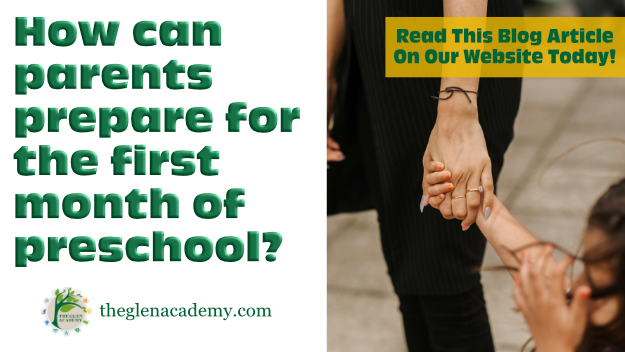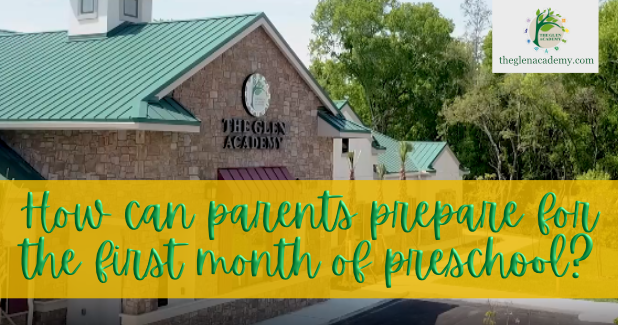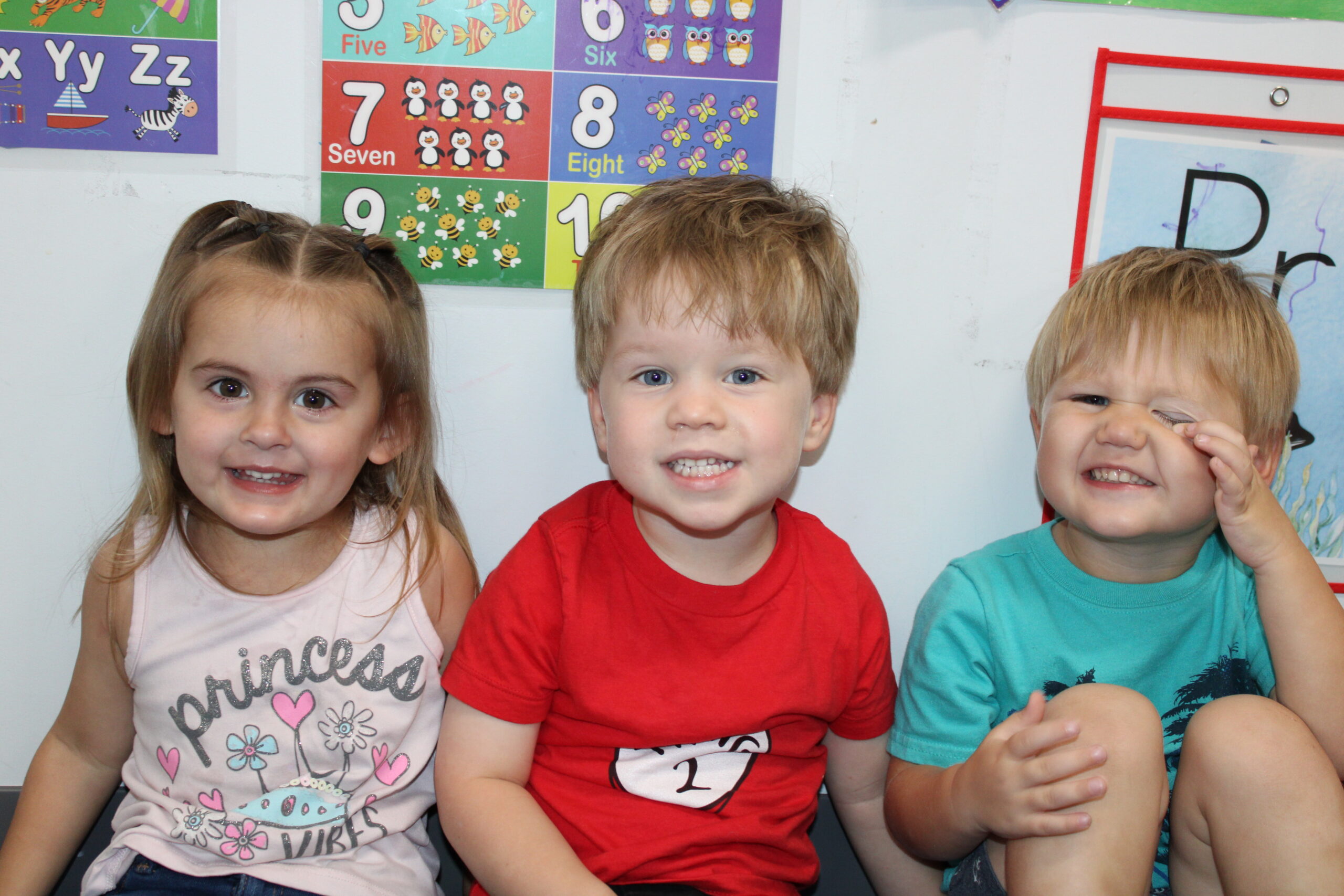How can parents prepare for the first month of preschool?
How can parents prepare for the first month of preschool? – Thanks for reading this blog article by The Glen Academy in Casselberry Florida. This blog article will help new parents understand what to prepare your child and yourself for when it comes to starting preschool. This article was written to answer the most frequently asked questions we get asked about. Enjoy!
Table of Contents
If your child is starting preschool, you may be approaching this major milestone with conflicting emotions. Keep in mind – that is perfectly normal. You’re probably excited about all the fun (you hope) your child will have and the new friends they’ll make. At the same time, you may feel a little sad that your baby is venturing out into the big world without you. Again, these emotions are normal. Your child is also bound to have a host of feelings about this transition, feeling proud to be a big kid. But be aware that at the same time, they might be worried about being separated from you and starting something unfamiliar. The Glen Academy has taken time to pull together a few tips to help toddlers prepare for preschool.

Have Fun With Preparing For Preschool
There’s a lot you can do in the weeks before to get ready for the big day. But try to keep your efforts low-key. If you make too big a deal out of this milestone, your child may end up being more worried than excited. Here are some ideas to keep the focus on fun.
Use pretend play to help toddlers prepare for preschool.
Take turns being the parent, child, and teacher. Act out common daily routines, such as:
- saying goodbye to mommy and/or daddy,
- taking off your coat,
- singing songs,
- reading stories,
- having Circle Time,
- playing outside,
- and taking naps.
Reassure your child that preschool is a good place where she will have fun and learn. Answer her questions patiently. This helps children feel more in control which reduces their anxiety.
Read books about preschool.
There are many books about going to preschool available from the public library in your area. Choose several to share with your child over the summer before school starts. Talk about the story and how the characters are feeling. Ask how your child is feeling. Here are a few good ones to think about getting for your family.
Make a game out of practicing self-help skills.
These skills include unzipping their coat, hanging the coat on a hook, putting on their backpack, and fastening/tying their shoes. For example, you might want to have a “race” with your child to see how quickly they can put on their shoes.
When you play school together, you can give your child the chance to practice taking off his or her coat, zipping their backpack closed, and sitting “criss-cross applesauce.” If your child will be bringing lunch, pack it up one day before school starts and have a picnic together. This will give her the chance to practice unzipping her lunch box and unwrapping her sandwich—important skills for the first day!
Play at your new preschool.
Visit your child’s preschool together. Ask when you can tour the school with your child. Play on the school playground a few times before your child starts the program. These visits help toddlers prepare for preschool and increase their comfort with and confidence in this new setting.
Answer Questions & Concerns About Starting Preschool
Your child may also have some questions or concerns about starting preschool, either before or after he or she starts in the fall. Help them get ready with these two key strategies:
1 – Listen to your child’s worries.
Although it’s tempting to quickly reassure your child and move on, it’s important to let your child know that their worries have been heard. No matter what they are, big or small, children’s worries about preschool can significantly influence their experience there. Will you remember to pick him or her up in the afternoon? Will his or her teacher be nice?
Let your child know it’s normal to feel happy, sad, excited, scared, or worried. Explain that starting something new can feel scary and that lots of people feel that way. It can be helpful to share a time when you started something new and how you felt.
When you allow your child to share their worries, you can help him or her think through how to deal with them. For example, if they are worried about missing you, the two of you can make a book of family photos to keep in a special spot like a cubby and look at when they feel lonely.
2 – Notice nonverbal messages.
As much as 3-year-olds may talk, most are not yet able to fully explain how they are feeling or what they are worried about. Your child may “act out” his worry by clinging, becoming withdrawn, or by being more aggressive. Another common reaction as children take a big move forward is to move backward in other areas. For example, if your child is fully potty trained, they may start having toileting accidents. They may ask that you feed or dress them even though they can do these things by themselves.
It is natural to be frustrated by this regressed behavior, and you may be concerned that if you do these things for them, they won’t go back to doing them themselves. Letting them play this out often leads to children returning to their “big kid” selves sooner. Remember that your child is facing—and managing—a big change in their life. They may need more support, nurturing, and patience from you while he or she makes this transition.
What to Do and When Preparing for Preschool
The last several days before starting preschool seem to zoom by! As you begin the countdown to the first day, here are some things to keep in mind:
During the 2 Weeks Before Preschool Starts:
- Purchase a backpack together with your child. If possible, let your child choose it themselves. This gives them a sense of control and emphasizes the fact that he or she is a “big kid” starting preschool.
- Label all items—backpack, jacket, shoes, blanket, teddy bear, etc.—with your child’s name and teacher’s name in permanent ink.
- Contact the preschool’s health professional if your child has medication that he or she takes daily. There will be special rules and forms to fill out for your child to receive medication at school.
- Figure out how your child will get to school and how they will come home. Talk to your child about the morning and afternoon routine so that they understand that she or he will be safe, okay, and cared for. Make sure your child meets their before- and/or after-school caregiver, if you are using one.
- Start using your child’s “school bedtime.” Children often go to bed later as the summer months, and longer days, kick in. Help your child get into a preschool schedule by keeping to his school bedtime, beginning about 2 weeks before school starts.
The Night Before Preschool:
- Answer any last-minute questions from your child.
- Let your child choose (weather- and school-appropriate) clothes for their first day.
- Make sure that your child goes to bed on time.
- Pick a bedtime that gives your child a good night’s rest before the first day. Keep the bedtime routine soothing and relaxing. Don’t focus too much (or at all!) on the first day of school unless he or she wants to.
The First Day:
- Wake up early enough so that you and your child don’t have to rush to get to preschool.
- Make breakfast for your child and, if possible, sit down to eat together—or at least talk with them as they eat as you get ready for the day.
- Review the day’s routine (what preschool will be like, how your child will get to school/come home).
- Pack your child’s backpack together. If your child is bringing lunch, select foods that you know are his or her favorites. Having some familiarity on his or her first day is helpful as they adjust to so many changes.
- Let your child choose a special stuffed animal or blanket to bring to school with them. These items can help children make the transition from home to school, and can also make naptime easier, too. You may want to send your child with a family photo or favorite book as well. These familiar objects can help if he or she feels lonely during the day.

What is a ‘Good’ Good-Bye?
A ‘good’ good-bye is a positive one. Your ‘good’ vibe sets the tone for where you and your child are making their moment of separation less stressful. Therefore, they can easily transition into something they look forward to. They can be ready for the day’s adventures knowing you have set a positive vibe with them.
Here are some strategies that can help toddlers prepare for preschool and ease the jitters of separating on your child’s first day.
1 – Plan to stay a little while.
Staying for 15-30 minutes on that first morning can help ease the transition. Together, the two of you can explore the classroom, meet some other children, and play with a few toys. When you see that your child is comfortable, it is time to leave. If he is having a harder time getting engaged, you may want to ask your child’s teacher to stay with your child as you say goodbye so that when you leave, he can turn to another caring adult for support.
2 – Keep your tone upbeat.
Children pick up on the reactions of the trusted adults in their lives. So try not to look worried or sad, and don’t linger too long. Say a quick, upbeat goodbye and reassure your child that all will be well.
3 – Think about creating a special goodbye routine.
For example, you can give your child a kiss on the palm to “hold” all day long. Or, the two of you can sing a special song together before you leave. Good-bye routines are comforting to children and help them understand and prepare for what will happen next.
4 – Resist the Rescue.
Try not to run back into the classroom if you hear your child crying, as upsetting as this can be. This is a big change and your child may, quite understandably, feel sad and a little scared. But if you run back in, it sends the message that he is only okay if you are there and it is likely to prolong your child’s distress and make it harder for him to adapt.
Be rest assured, teachers have many years of experience with helping families make the shift to preschool. Instead, you can wait outside the classroom for a few minutes to ensure that all is well, or call the school later in the morning to check-in.
What are different ways to prepare your child for Preschool?
Preparing your child for preschool can greatly reduce any separation anxiety they may feel when you leave. Here are some ways to familiarize your youngster with their new environment.
Explain the routines of preschool.
Tell them about the games they’ll play, the kids they’ll meet, and how you’ll always be there to pick them up at the end of the day. Don’t overhype school, and don’t make promises about things you can’t control (like making new friends). If your child’s initial experience doesn’t match their expectations, school may already seem scary, not exciting.
Meet the teacher.
Many preschools host an open house, where parents, teachers, and children can get to know each other. There will likely be many parents vying for the teacher’s attention, but make sure you get a chance to chat with them when your child is within earshot. “
A good piece of advice is that if you show your child that the teacher is someone you like and trust, he or she will have an easier time forming an attachment to that new teacher.
Visit the school.
Before the school year, take your child around the classroom and point out the different activities they’ll do each day. Also, tell them the name of the school.
Here is another good piece of advice – over the first week or so leading up to preschool, prepare him or her for the first day by saying, ‘Next week you’ll go to The Glen Academy Preschool and play outside on the playground equipment.
What’s more, whenever you’re driving by the school, casually point it out to your child, it lets them know you know where it is and they do as well. It will give them pride to be going to preschool there.
Set up playdates before the school year.
Seeing familiar faces in their class will increase your child’s comfort level. Most preschools will give you a class list during the summer.
Here is a piece of advice – plan playdates with some other classmates before the big day.
If your child enjoys playing with their friend, consider asking about setting up a buddy system; you and another family in the class have each other as contacts for playdates and support before school begins.
Keep a positive mindset.
Your child will take cues from you, so be calm and confident that everything will go well. You don’t want to ask them if they’re scared too many times—that might make them even more fearful, says Flynn. But if they seem anxious in the days preceding school, reassure them that everything will be OK and that you’re nearby if they need you.
Role play.
Pretend play with stuffed animals can help your child adjust to the idea that they’ll be leaving you, but you’ll come back. Here is a good example, their teddy bear goes to school with some other furry friends, and Mommy Teddy leaves and returns after they’ve sung a song and had a snack. This will plant a seed in your child’s mind – that you will come back and just focus on having fun.
Read books.
Did you know that books that describe what happens at school, as well as validate a child’s feelings? It is true and they can help quell jitters your child might have. By taking time to read these types of books you will provide your child with a sort of dry run of school in the comfort of home, where they feel safe.
How does a new parent handle Preschool Drop-Off?
No matter how much you prepare, your preschooler will still be full of nerves on their first day. Here’s how to make drop-off a little easier.
Create a goodbye ritual.
Having a goodbye routine provides comfort and familiarity, so your child knows what’s to come. This could be anything you and your child decide on, such as a special hug or handshake followed by a “See you later, alligator!”
Once you’ve said your goodbyes, it’s best to skedaddle so that your child doesn’t become preoccupied by your presence. A long farewell scene might only serve to reinforce a child’s sense that preschool is a bad place.
Parents should never be ripped away abruptly from their child either – a good preschool will help with the transition but never forcefully. It can take up to ten weeks for a child to fully be ready to be left at school without their parent.
Don’t sneak away.
That said, some little ones will feel more afraid if you suddenly disappear. The best way to handle the separation process is to have the parent go to school and sit next to their child. They should not interact with them in games and toys but rather be there as a safety net.
If using this approach, it would be important for the parent to let the child know when they’re going to leave, and then be sure to leave at that time. Try setting a visual timer so that they can see time passing and how much time they have left before their parent goes. You also can leave a transitional object with them—something small that reminds them of their parent (e.g. a picture, bracelet, shell, or stone). Give clear warnings before it’s time to go and then when you say your goodbye, go.
Bring a comforting object.
Have your child bring a little reminder of home to ease their separation anxiety. If they don’t have a favorite doll or blankie, even a beloved book or a sippy cup filled with their favorite drink can do the trick. Comfort objects may seem like small stuff to you, but they can provide a real sense of security to kids in an unfamiliar environment.
Never make comparisons.
Honoring your child’s process is the best way to make the transition to preschool as smooth as possible. The child who never cries when his or her parent leaves them may act out the scene over and over again during play to process their feelings.
Another child may need to cry at every separation for a while in order to work through his or her feelings. Therefore, don’t chastise your toddler and say something like that child over there doesn’t cry when his mom leaves.
Remind them that you came back.
When you pick them up at the end of the day, reinforce the idea that you came back, just like you said you would. This way, each day’s drop-off won’t feel like you’re both starting teary and upsetting goodbyes all over again.
What are some tips for parents dealing with Preschool Separation Anxiety?
Don’t minimize the importance of easing your fears as well as your child’s. If you feel guilty or worried about leaving them at school, your child will probably sense that. The more calm and assured you are, the more confident your child will be.
Get to know the teacher beforehand.
Your child can benefit from meeting their teacher before school—but so can you. Ask your child’s teacher what their procedure is when children are crying for their parents. Make sure a school staff member is ready to help your child with the transfer from your care to the classroom.
Here is a useful tip to consider – it’s helpful for the teacher to know as much as possible about a child’s home life in order to ease their transition into preschool.
So what does that mean? A teacher should know your child’s eating, sleeping, and toileting patterns. Why? Because they are just as important as knowing their favorite color, what games they like to play, or what songs they like to sing.
Knowing this can also help to know what techniques the family uses to calm a child down when he or she is feeling upset or anxious. A good teacher by knowing this can try to replicate those techniques in the classroom. Be sure to let the teacher know about any medical issues, such as food allergies as an example.
Think of preschool as a life lesson.
Many parents may see their child have a bad first reaction to preschool and immediately decide to pull them out of the classroom. But that’s a bad idea and here is why – It denies the child an opportunity to learn how to work through negative feelings and sets a precedent of not having to face problems.
Resist surprise visits
Once you’ve left your child, resist the temptation to go back and check on them, and don’t phone the school every hour. Keep in mind that if you’re always checking up on your child, you risk the reciprocity of your child checking on you constantly. That is not what you want to be in your child’s mind vs. having fun and learning new things.
Give yourself a pep talk.
Come up with a mantra such as, “The Glen Academy is the best place for (your child’s name)” or “Bringing (your child’s name) to The Glen Academy is the right decision” to remind you of why being apart is good for both you and your child. Then, keep repeating it as often as you need it!
Have patience with your preschooler.
It’s OK to keep leaving the child if they keep crying. Did you know that a complete and successful transition into school can take months? It is true, especially if there are family vacations or breaks from preschool, when children often regress, or if there are changes happening at home.
But be rest assured that in all the years of teaching, The Glen Academy hasn’t encountered one student who couldn’t overcome their separation anxiety.

How can parents prepare for the first month of preschool? – Thanks for reading this blog article written by The Glen Academy!
The Glen Academy wrote this article to help you better understand ‘How can parents prepare for the first month of preschool?‘
If you still have questions, please call us and ask our caring staff members about them today. Follow us on Instagram, Google Profile, and Facebook now! Remember The Glen Academy loves caring for your child no matter what stage of early childhood he or she is in. Again, thanks for reading this blog article.
